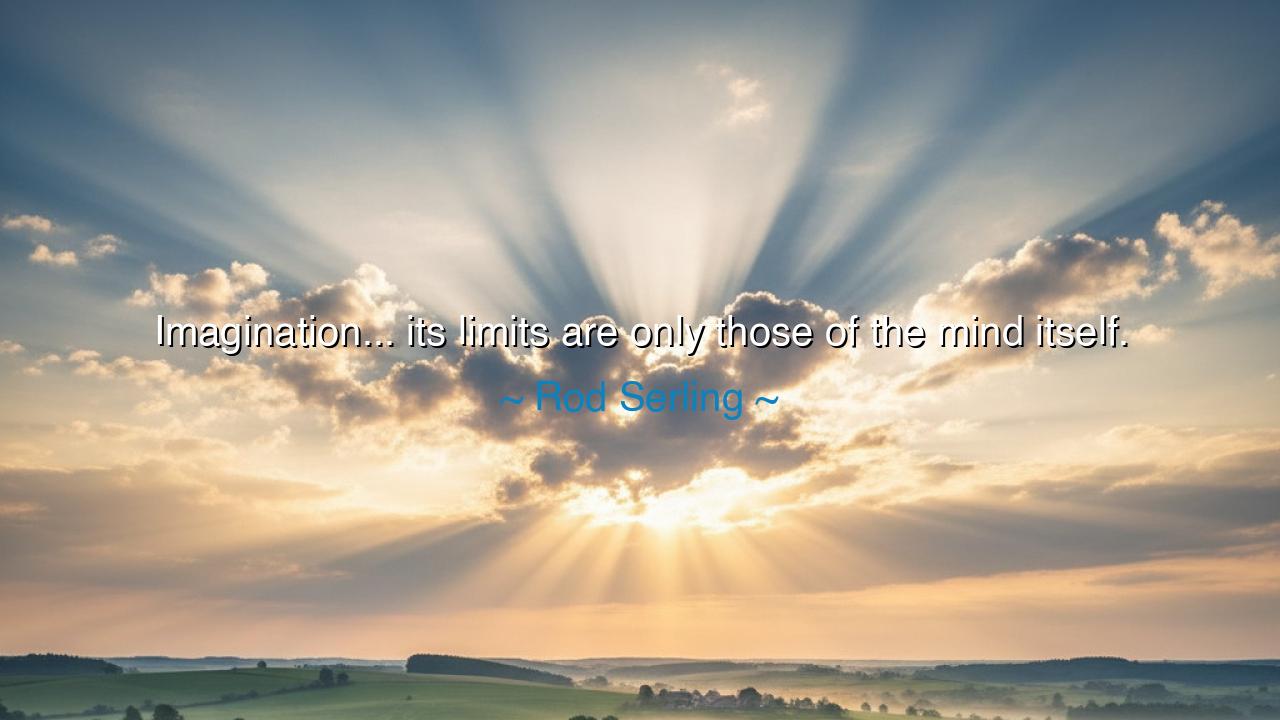
Imagination... its limits are only those of the mind itself.






“Imagination… its limits are only those of the mind itself.” — so spoke Rod Serling, the visionary creator of The Twilight Zone, whose voice carried both the gravity of reason and the electricity of wonder. In this profound statement, Serling declares that the boundaries of creation are not written in the world around us but drawn within the mind. What he means is simple yet infinite: the imagination — that divine spark within every soul — knows no walls except those we ourselves construct. It is the key to invention, to empathy, to the very evolution of humankind. Serling’s words remind us that imagination is not a toy of dreamers but the engine of reality, the unseen force that turns the impossible into the inevitable.
To understand the origin of this truth, one must know the man who spoke it. Rod Serling was not merely a storyteller — he was a moral philosopher cloaked in the garments of science fiction. In The Twilight Zone, he built worlds not with machines, but with questions. His tales were mirrors — reflecting the fears, hopes, and hypocrisies of an age trembling between war and wonder. When he spoke of imagination, he spoke from the frontier between what is known and what is felt, where the human spirit meets the mystery of existence. To Serling, imagination was the bridge — the luminous path by which mortals reach toward the infinite.
When he says that imagination’s limits are “only those of the mind itself,” Serling reveals the sacred paradox of human power: that the greatest barriers to discovery are not of matter, but of thought. The universe itself — vast, silent, eternal — is nothing compared to the depth of the human mind that contemplates it. Those who dare to dream without fear, to think beyond the given, become the architects of destiny. Every leap of progress — from the fire of Prometheus to the flight of the Wright brothers, from the words of Shakespeare to the orbits of space — began first as a glimmer in the imagination. The cosmos expands because consciousness dares to see further.
Consider the story of Albert Einstein, who once said that imagination is more important than knowledge. As a young man, he envisioned himself riding upon a beam of light — a fantasy of the mind, a child’s daydream. Yet from that vision grew the theory of relativity, a revelation that forever changed how humanity perceives time and space. This is the very truth Serling speaks of: imagination is not idle fancy; it is the blueprint of creation. The only true limitation lies within the mind that refuses to see beyond its own horizon. Those who imagine freely touch eternity, while those who live only by habit remain bound to the shadows of their own making.
Yet Serling’s insight is not only about invention — it is about freedom. For the imagination is also the power to reimagine the self, to transcend suffering, to create meaning where there was despair. In the prison of circumstance, imagination opens a window; in the desert of apathy, it brings forth an oasis. Serling’s own work often portrayed characters trapped in illusion, yearning for truth. And it was always the act of awakening — of seeing with the mind’s eye — that set them free. Thus, the mind becomes both the cage and the key, the darkness and the dawn. To imagine rightly is to liberate the soul.
But we must heed his warning: if imagination is limitless, so too is its danger. For the same power that can build worlds can also destroy them. The horrors of war, the cruelty of prejudice, the weapons of fear — these too are born of imagination corrupted by ignorance. Serling understood this deeply. His stories, filled with science fiction, were not fantasies of escape but meditations on morality. He showed us that imagination, unguided by conscience, becomes nightmare. Therefore, we must not only imagine — we must imagine wisely, shaping our visions with compassion, humility, and awe.
The lesson, then, is clear: the mind is the horizon of human possibility, and the imagination is its light. To live without imagination is to live without sight. Feed it, nurture it, challenge it. Read deeply, dream boldly, question fearlessly. When doubt whispers that something cannot be done, let imagination answer that it already has — if only in thought, and thought is the seed of being. The world as we know it was imagined first; the world to come will be imagined next.
So remember the wisdom of Rod Serling — that the limits of imagination are not in the stars, nor in the laws of nature, but in ourselves. Open the gates of your mind, and you will see that the impossible is only the undiscovered. The universe waits for those who dare to think beyond the known. For the mind that imagines freely stands not in the twilight of its power — but at the dawn of creation itself.






AAdministratorAdministrator
Welcome, honored guests. Please leave a comment, we will respond soon